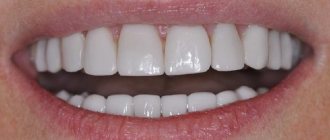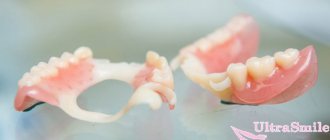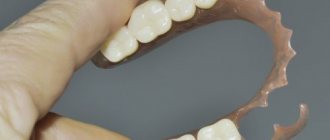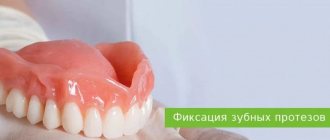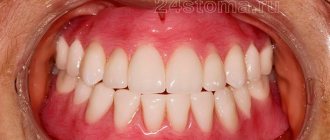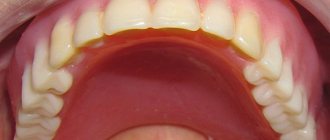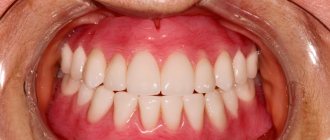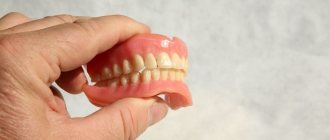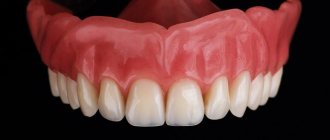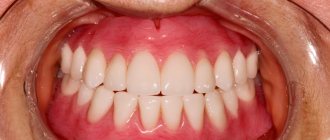Removable dentures are a common method of dental restoration in modern dentistry. Most often, removable dentures are used for dental restoration in elderly people. The method of dental prosthetics using removable dentures helps you quickly return to your previous active life without discomfort, and also restores the beauty of your smile. It will only take you a few days to get used to the dentures. We will also tell you how to speed up this process in the article. If you want to read about addiction right now, click on the link. Removable dentures fully reproduce the main function of teeth - crushing and chewing food.
Caring for dentures
- Types of structures
- Plastic dentures
- How to care at home
- How to care and store
- Nylon dentures
- Clasp dentures
- Care products
Dentures require careful care.
In order for them to serve their owners for a long time, you need to learn how to carefully care for them and store them correctly. Their insufficient cleaning and non-compliance with hygiene rules often cause destruction of neighboring teeth, inflammation of the gums, and bad breath. It is also important to listen to the recommendations of the doctor, who, when installing such structures, should tell the patient how to use them correctly. Dentures will retain their original appearance for a long time, provided:
- choosing the right cleaning product;
- maintaining daily oral hygiene;
- Visit the dentist at least twice a year for professional cleaning.
The main task of people who wear such designs is to maintain their aesthetics and durability. This can only be achieved if denture care is carried out in accordance with their type.
Eating with artificial teeth
Dietary restrictions when using removable dentures relate mainly to the adaptation period. At this time it is recommended:
- predominance of soft and liquid foods in the diet;
- thoroughly grinding food before consumption to facilitate chewing;
- chewing on the side on which loads cause less discomfort;
- limiting loads on the front part of the structure (it is undesirable to bite off food using the front teeth).
In addition, during the process of habituation and during the entire period of use, it is necessary to avoid sticky foods (taffy, chewing gum) and very hard foods (nuts, crackers), as they can lead to disruption of fixation and even breakage of the orthopedic structure. You should not eat very hot food with acrylic dentures. High temperature is one of the negative factors that can shorten the service life of the product.
The condition and durability of the prosthesis are negatively affected by smoking, drinking strong coffee and tea. If stains appear on your denture, you should contact your doctor. In most cases, it is possible to restore the original color and shine of the product in a dental laboratory.
An orthopedic dentist will give you more detailed recommendations regarding the care of removable dentures.
Types of structures
There are two types of dentures: removable and fixed. Nylon and acrylic models are removed and can be cleaned with running water, preferably boiled. But it is better to clean with special solutions that are effective in getting rid of bacteria. They are purchased in pharmacies in ready-made form or in tablets dissolved in water. To fix such structures, glue, cream or strips are used.
These care methods also apply to partially removable structures, which include clasp models. Fixed veneers, implants, bridges, crowns require more careful care. Dental floss is used to clean hard-to-reach areas. Interdental brushes are also effective. You need to complete the procedure of cleaning from food debris by rinsing your mouth using special products.
Plastic dentures
Rinsing after eating, cleaning with toothpaste, disinfection - these are the main rules for caring for plastic dentures.
The ideal option would be to clean them regularly after eating. If this is not possible, thorough cleaning 2 times a day is allowed. To remove plaque in hard-to-reach places, brushes and dental floss are additionally used.
Plaque is removed by washing with water, brushing with a special paste, and the procedure ends by placing the structure in an antiseptic solution. Twice a year it is necessary to take it to the dentist for professional cleaning to remove deposits and stones.
Causes of wear
- Use of abrasives. When cleaning the denture with toothpaste with a whitening effect, scratches may appear on the structure, which contributes to the accumulation of bacterial plaque on the denture.
- Insufficient maintenance of the structure. A dirty denture often causes rapid wear and tear and causes inflammation in the oral cavity.
- When smoking, drinking coffee or strong tea, dental structures turn yellow and a brown plaque forms on them, which is difficult to remove.
How to care at home
The products used to clean your home can achieve good results. The most important thing is to regularly care for your dentures at home. But professional cleaning should be an equally significant addition to home care.
When cleaning them at home you need to use:
- with a soft toothbrush (carefully treat areas of contact with the gums);
- non-abrasive toothpaste (you can use gentle children's toothpaste);
- tablets - indicators of bacterial plaque;
- disinfectant solutions (antiseptics, rinses containing chlorhexidine, special tablets).
Treatments using vinegar or lemon are especially popular. Frequent cleaning with vinegar is not advisable, as it negatively affects the strength of the teeth. You can use this method sometimes by placing the structure in vinegar for 2 hours.
It is safer to mix a quarter of a lemon with toothpaste or powder and apply the mixture and leave for 20 minutes. Then rinse with running water. Some people try to use baking soda, but doctors say there are no results from such cleansing, despite the prevailing opinion about its effectiveness.
Who is it suitable for?
Nylon denture systems can be installed to either recreate missing teeth or cover existing but unsightly ones. The use of prostheses is indicated in the following cases:
Products are installed if one or part of the teeth in the jaw is lost; they are installed in cases of complete edentia - the absolute absence of teeth. They are used when, for financial reasons, it is impossible for a patient to have implantation and installation of clasp types of prostheses.
Indicated when implants are prohibited from being implanted into a patient due to the presence of various diseases. Although nylon prostheses can be used even with existing diabetes, disorders of the cardiovascular system, even epilepsy and other diseases.
Nylon structures are often recommended for installation by children. They are used in situations where a baby tooth has been removed and a permanent replacement does not appear for a long time. In this case, prosthetics prevent the displacement of a number of teeth in the jaw and subsequent deformation of the bite.
Used in the presence of pathology such as periodontal disease. This untreated disease can lead to the loss of all teeth. Wearing a prosthesis is indicated only in the first and second stages of the disease.
Used for temporary prosthetics during the period of tissue adaptation during implantation.
Dentists sometimes recommend wearing them for people involved in dangerous work, a high risk of various injuries, including damage and loss of teeth: athletes, employees of the military and law enforcement agencies, and others.
How to care for and store dentures
In the past, when removable plastic structures were made from air-drying rubber, they were stored in an aqueous solution. Now they are made on the basis of acrylic and nylon, which do not require such storage.
Proper care and storage of dentures is an important condition for their long service life. Therefore, it is worth listening to the advice of doctors who recommend not removing them at night, especially immediately after installation, so that the person can get used to them and the articular heads of the jaws do not move. When removing them at night, they do not need to be kept in liquid; they can be left dry, wrapped in a clean napkin.
It is not recommended to remove clasp structures while sleeping, especially if you have periodontal diseases, but if you need to remove them for a short period of time, they need to be thoroughly cleaned, dried and placed in a case.
Popular brands of storage boxes for removable devices
We've looked at where it's best to store dentures at night or when you're not using them. Purchase a protective box where, if necessary, you can pour a disinfectant solution.
There are a lot of brands of containers available today, and the patient faces a difficult choice. For example, there are models with backlight, some with mesh, some with ultrasound for thorough removal of plaque and dirt, as well as for disinfection. You can also purchase standard classic boxes, which do not provide additional functionality.
To make it easier for you to decide, we present several brands of containers that, according to patient reviews, are in greatest demand.
Curaprox
This is a Swiss brand whose quality has been tested by time. The products are manufactured by CURADEN1, which was founded back in 1940. Today it is represented in Europe, America, Asia, the Middle East, and since 2005 in Russia.
The photo shows a Curaprox container
The container of this brand is made of durable medical polypropylene. It is opaque, which will allow you to hide its contents from others. It has a safety lock on the lid, which prevents unexpected opening of the box and spillage of disinfectant liquid. Cost – from 950 rubles.
Bradex (“Bradex”)
These are Israeli-made products. The container is equipped with an ultrasonic system to thoroughly clean and disinfect your removable devices. Made of plastic, lightweight, has a sealed lid. Operates on 2 AA batteries. Cost – from 600 rubles.
The photo shows a Bradex container
Sonic Denture Cleaner
If you are still thinking about how to store removable dentures correctly, then purchase a device from Song Young (Taiwan) - Sonic Denture Cleaner, which will solve all your problems. This is a universal box for storing and cleaning removable systems. It is equipped with an ultrasound function and will easily help remove dirt, bacteria, stubborn plaque and stains from the product. Cost – from 700 rubles.
This is what the Sonic Denture Cleaner container looks like
Miradent
This box is a representative of the German company Hager&Werken, which has existed since 1982. The container is shockproof, has holes for air circulation and a very reliable double latch that prevents it from opening and the product falling out. Cost – from 800 rubles.
The photo shows the Miradent container
Notice
: Undefined variable: post_id in
/home/c/ch75405/public_html/wp-content/themes/UltraSmile/single-item.php
on line
45 Notice
: Undefined variable: full in
/home/c/ch75405/public_html/wp-content /themes/UltraSmile/single-item.php
on line
46
Rate this article:
( 16 ratings, average: 3.63 out of 5)
prosthetics
- According to the official website of the manufacturer curaprox.ru
Expert “Protective containers are suitable for storing dentures at night. It is preferable that it be made of impact-resistant plastic that retains its original characteristics for a long time and does not accumulate bacteria. Also, the choice must be made taking into account the shape and size of the prosthesis; you should not buy a container that is too large or, conversely, too tight, which can lead to deformation of the structure.” Orthodontist Vagapov Zakir Irkinovich
Consulting specialist
Vagapov Zakir Irkinovich
Doctor rating: 7 out of 10 (3) Specialization: Orthodontist Experience: 15 years
Nylon dentures
To preserve the properties of nylon structures for a long time, we must not forget about special care, otherwise the loss of their aesthetics and functionality and an unpleasant odor are guaranteed.
Caring for nylon dentures involves home and professional cleaning. When cleaning the house, nylon can be scratched if you use hard brushes. Therefore, it is recommended to acquire only soft models of brushes and pastes that do not contain abrasive substances. To protect against damage, they should be put on or taken off over a sink filled with water. You can fold a terry towel in several layers and carry out these manipulations over it.
Due to the fact that this material is capable of absorbing foreign odors and being stained by drinks and food, wearers of such prostheses need to disinfect them more often. For these purposes, dental nylon liquid, cleansing tablets such as Corega or ROCS are used.
To remove bacterial plaque from them that cannot be cleaned at home, an ultrasonic bath is used. The procedure is performed by a doctor in the clinic, where he also examines the gums under the structure. Thanks to the use of ultrasound, the surface gets rid of not only bacteria, but also coloring substances (nicotine) and tartar.
Clasp dentures
Partially removable clasp structures are made from different materials. The most commonly used materials are cermets and plastics. Depending on the type of material, it is determined what the optimal care for clasp dentures will be.
The peculiarity of caring for them is explained by the fact that their arches are made of metal. This requires a special approach to cleaning. When an arc is made of several separate parts, the joints should not be mechanically processed to avoid darkening and staining on them. When cleaning, only use a soft brush. Otherwise, care is similar to that of other removable models. Only once a week you need to treat them in a biological solution designed to remove stubborn stains and food debris.
If home care does not give the desired effect, then professional cleaning is recommended to remove hard deposits and plaque. This needs to be done once every six months.
It is not necessary to remove the clasp structures at night, especially during the first 2 weeks.
Comments
I heard that dentures need to be stored in a cool place, on the forum they even advised putting them in the refrigerator, is this really true?
Alla (01/29/2020 at 15:28) Reply to comment
- Dear Alla! There is no scientific evidence that dentures keep better in the refrigerator. But a sharp change in ambient temperature, for example, cold or heat, can equally lead to deformation of the product, breakdowns and its premature failure.
Editorial staff of the portal UltraSmile.ru (02/04/2020 at 09:19) Reply to comment
Write your comment Cancel reply
Care products
Modern means for caring for dentures are varied and more effective than the old-fashioned solutions with soda and potassium permanganate, which will do more harm than good. They are specially designed for different types of structures, therefore they are absolutely harmless.
Care products can be fixative or cleansing. The most popular of them are fixing adhesives and creams. They contribute to a reliable fit of the prosthesis and redistribution of the load during chewing. It prevents food debris from getting under them and does not rub the gums, since the glue creates an airtight cushion. At night, the structure with fixing substances must be removed, this is the condition for their use.
Fixing powder is suitable for people with weak salivation. A thin layer of powder is applied to the structure, which is pressed tightly against the gums, creating an obstacle to food particles. And strips of special canvas for fixation are necessary if a person has an abnormal jaw structure.
Another common remedy is special tablets that dissolve in water. This solution can not only clean dentures, but also whiten them. True, they do not work on persistent nicotine stains; you will need the help of a dentist who will remove them with ultrasound. This needs to be done every six months.
Rinsing, cleaning, disinfection, professional care - these are the main components of the care process. And what means are used for them will depend on the specific model of prostheses.
Nylon or acrylic: which is better?
Nylon prostheses are called “flexible” due to their elasticity. They are more convenient, and also less noticeable, than their predecessor counterparts - removable structures made of acrylic. The products are more aesthetically pleasing, but have a higher cost. A small list of contraindications for prosthetics. They do not cause allergic reactions. These elastic designs are created with a soft nylon base that is almost invisible in the mouth. The products are very comfortable to wear.
Undeniable advantages
nylon products:
- hypoallergenic - can be used for allergies;
- ease of care of the medical system;
- durability - have a long service life;
- durable and elastic, easy to use - able to withstand significant mechanical loads;
- have reliable fastening;
- do not require grinding of adjacent teeth or other painful procedures during installation;
- gel agents are not required for their fixation;
- can be worn constantly;
- does not accumulate foreign odors;
- microbiological inertness - the development of various pathogenic bacteria on the surface of the prosthesis is not supported;
- are easy to polish, so they fit tightly to the gums;
- diction is not violated;
- can be used by people suffering from heart disease and diabetes;
- It is possible to select any crown material for the manufacture of the product - the technology is available to people with different incomes.
There are also disadvantages
: fragility and softness of the manufacturing material - does not always withstand the load created during chewing. Over time, the structure “sags,” which can lead to gum injury. When wearing such structures, you should definitely monitor your oral cavity and visit the dentist with the frequency recommended when purchasing dentures.
Acrylic dentures have become widespread and inevitably enjoy considerable popularity. They are noticeably inferior in aesthetic characteristics to conventional ceramics or options made from metal ceramics. The weight of the structure is light, it does not require special care, and most importantly, it is inexpensive.
In a significant number of cases, older people are given acrylic dentures, which have an optimal quality-to-price ratio. They can be placed with partial or even complete edentia. And they are also recommended in cases where the patient has a significant gap in a row of teeth.
Advantages of acrylic products:
- almost absolute absence of contraindications;
- the product is suitable for both temporary and permanent wear;
- pleasant and easy to use
- has many shades, and therefore the color of artificial teeth will not differ from real ones;
- fastening using hooks allows you to avoid grinding down adjacent teeth;
- suitable for people of different age groups;
- have a reasonable price.
There are also disadvantages: the difference between an acrylic prosthesis and a nylon one is that it emits acrylic methacrylate, which can be negatively tolerated by the body; In the process of wearing dentures, the teeth adjacent to them are subject to abrasion, and the development of caries can result from this. They are quite fragile, despite this they can be used for about 8 years. It will take some time to get used to them.
